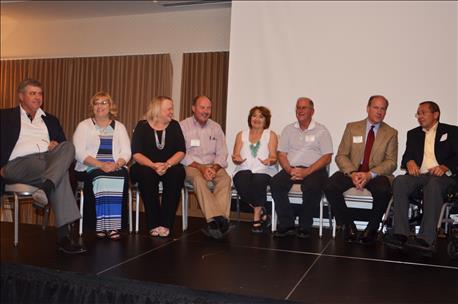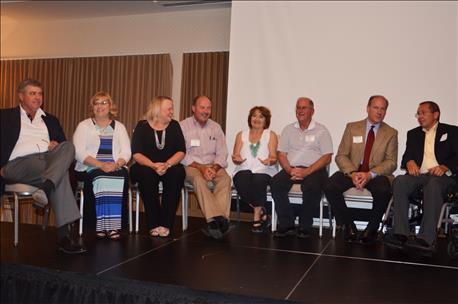
The Master Farmer program was designed with one goal in mind. It attempts to shed light on farm families who work diligently to build a successful farm operation and an even better family and community. To be a Master Farmer, you must be nominated by one of your peers.
Indiana Prairie Farmer and Purdue University’s College of Agriculture sponsor the Master Farmer program. The deadline for nominations is Feb. 15. The 2017 class of Master Farmers will be honored during the Indiana Farm Management Tour, tentatively slated for June 22-23 in Carroll and Howard counties.
Here is more information about the award.

NEWEST MASTER FARMERS: The 2016 Master Farmer class includes (from left) Tom and Karen McKinney, Kempton; Nan and John Nidlinger, Decatur; Darci and Don Zolman, Pierceton: Bret Marsh, Indianapolis; and Dan Gwin, Linden.
• Early era. The Master Farmer program began in 1925 with a banquet in Chicago. Clifford Gregory, editor of Prairie Farmer at the time, initiated the program to honor farmers. The program was discontinued after 1935. Some 85 Indiana farmers were honored during that first decade. Information on the early era was compiled by Carl Eiche, former senior editor of Indiana Prairie Farmer. Eiche was heavily involved in carrying out the program in Indiana.
• Modern era. The Master Farmer program was restarted in 1968 at the suggestion of James C. Thomson, then managing editor of Prairie Farmer. Ten farmers were honored in 1968. Several more were honored in 1969 and 1970. Beginning in 1971, five were honored annually. Today, typically four farmers and/or farm couples are honored annually. More than 200 Indiana farmers and farm families have been named Master Farmers in the modern era.
• Eligibility. Any farmer or farm couple is eligible to be nominated for the Master Farmer award. The nomination can be made by neighbors, other farmers, Extension educators or ag business people. It can’t be made by a member of the Indiana Prairie Farmer staff.
• Judging committee. A committee of three reviews nominations each year, typically in March. The committee consists of the dean of the Purdue College of Agriculture, a former Master Farmer and a third person selected by the editor of Indiana Prairie Farmer. Carl Eiche has served in that position since his retirement from writing in 1994.
• Judging criteria. Judges do not use a scorecard. Instead, they rely on their judgment and instincts. They report that they look for people who have developed a sound farming operation, who believe in conserving natural resources, who have a love for family, and who desire to serve their local community and agriculture, even at the state and national levels. However, it’s not necessary to have leadership experience at the state or national level to be considered for the award.
• Nomination process. To nominate someone, obtain a nomination form. Whether you tell the person you are nominating them is up to you. However, you will likely need to work with someone who has knowledge of their farming program. You also need to obtain six letters of support from people who know the nominee(s).
• More information. Contact Indiana Prairie Farmer at 317-431-8766, [email protected] or P.O. Box 247, Franklin, IN 46131 for a form. You may also find a nomination form and more information at IndianaPrairieFarmer.com.
Hard copies of the entry must be sent to the P.O. box postmarked by Feb. 15.
About the Author(s)
You May Also Like




